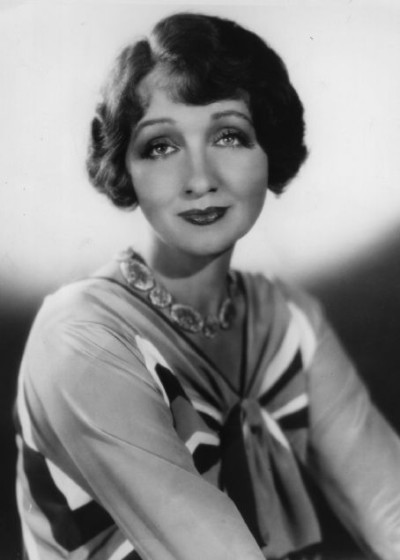Hedda Hopper (Elda Furry)

Hedda Hopper was born Elda Furry in Hollidaysburg, Pennsylvania, the daughter of Margaret (née Miller 1856-1941) and David Furry, a butcher, both members of the German Baptist Brethren. Her siblings included Dora, Sherman, Cameron, Edgar, Frank and Margaret. Her family was of Pennsylvania Dutch (German) descent. The family moved to Altoona when Elda was three. She eventually ran away to New York City and began her career in the chorus on the Broadway stage. Hopper was not successful in this venture, even getting the axe by the renowned Shubert Brothers. Florenz Ziegfeld called the aspiring starlet a “clumsy cow” and brushed off her pleas for a slot in his lavish Follies. After a few years, she joined the theater company of matinee idol DeWolf Hopper, whom she called “Wolfie” and would later marry. She remained in the chorus and they toured the country. While in the Hopper company, she realized that chorus and understudy jobs were not acting. She wanted to act, and she knew she would have to prove herself before she could hope to get anywhere in the theater. Hearing that Edgar Selwyn was casting his play The Country Boy for a road tour, she went to his office and talked him into letting her audition for the lead. She was given the role and that show toured for thirty-five weeks through forty-eight states. She studied singing during the summer and, in the fall, toured with The Quaker Girl in the second lead, the prima donna role. The show closed in Albany. In 1913, she became the fifth wife of DeWolf Hopper, whose previous wives were named Ella, Ida, Edna and Nella. The similarity in names caused some friction, as he would sometimes call Elda by the name of one of his former wives. Consequently, Elda Hopper paid a numerologist $10 to tell her what name she should use, and the answer was “Hedda”. She began acting in silent movies in 1915. Her motion picture debut was in The Battle of Hearts (1916) with William Farnum. She appeared in more than 120 movies over the following twenty-three years, usually portraying society women.
As her movie career waned in the mid-1930s, Hopper looked for other sources of income. In 1937, she was offered the chance of a lifetime and embarked on a career doing something she was quite adept at: gossip. Her gossip column called “Hedda Hopper’s Hollywood” debuted in the Los Angeles Times on February 14 (St. Valentine’s Day), 1938. After years of struggling as an actress, she had finally found her niche. She christened the home she purchased in Beverly Hills “The House That Fear Built”. She maintained a notorious if self-serving rivalry with the longer-established and better-liked Louella Parsons, who had formerly been friendly, sometimes even passing Hopper information. Hopper and Parsons became arch rivals competing fiercely, and often nastily, for the title “Queen of Hollywood”, although those who knew both agreed that Hopper, a former actress, was far more vicious and unforgiving in her dealings with those who displeased her than rivals Parsons and Sheilah Graham were ever known to be. Hopper had an acting role in a radio soap opera, playing Portia Brent on the Blue Network’s Brenthouse beginning in February 1939.[13] She debuted as host of her own radio program, The Hedda Hopper Show, November 6, 1939. Sponsored by Sunkist, she was heard on CBS three times a week for 15 minutes until October 30, 1942. From October 2, 1944 to September 3, 1945, Armour Treet sponsored a once-a-week program. On September 10, 1945, she moved to ABC, still sponsored by Armour, for a weekly program that continued until June 3, 1946. Hopper moved back to CBS October 5, 1946, with a weekly 15-minute program, This Is Hollywood, sponsored by Procter & Gamble. It ran until June 28, 1947.
Expanding to 30 minutes on NBC, she was host of a variety series, The Hedda Hopper Show, broadcast from October 14, 1950 to November 11, 1950 on Saturdays, then from November 19, 1950 to May 20, 1951 on Sundays. This program featured music, talk and dramatized excerpts from movies with well-known guests, such as Broderick Crawford doing a scene from All the King’s Men. On January 10, 1960, a television special, Hedda Hopper’s Hollywood, aired on NBC. Hosted by Hopper, guest interviews included a remarkably eclectic mix of past, current and future stars: Lucille Ball (a longtime friend of Hopper), Francis X. Bushman, Liza Minnelli, John Cassavetes, Robert Cummings, Marion Davies (her last public appearance), Walt Disney, Janet Gaynor, Bob Hope, Hope Lange, Anthony Perkins, Debbie Reynolds, James Stewart, and Gloria Swanson. Hopper had several acting roles during the latter part of her career, including brief cameo appearances as herself in the movie Sunset Boulevard (1950) and The Patsy (1964), as well as episodes of The Martha Raye Show, I Love Lucy, The Ford Show, Starring Tennessee Ernie Ford, and The Beverly Hillbillies, starring Buddy Ebsen. Her autobiography, From Under My Hat (Doubleday, 1952) was followed by The Whole Truth and Nothing But (1962), also published by Doubleday. She remained active as a writer until her death, producing six daily columns and a Sunday column for the Chicago Tribune syndicate, as well as writing articles for celebrity magazines such as Photoplay. Hopper died on February 1, 1966, of double pneumonia at the age of 80 in Cedars of Lebanon Hospital in Hollywood. She is buried at Rose Hill Cemetery, Altoona, Pennsylvania. For her contribution to the motion picture industry, Hopper has a star on the Hollywood Walk of Fame at 6313½ Hollywood Boulevard in Hollywood.
Born
- May, 02, 1885
- USA
- Hollidaysburg, Pennsylvania
Died
- February, 01, 1966
- USA
- Hollywood, California
Cause of Death
- pneumonia
Cemetery
- Rose Hill Cemetery
- Altoona, Pennsylvania
- USA



